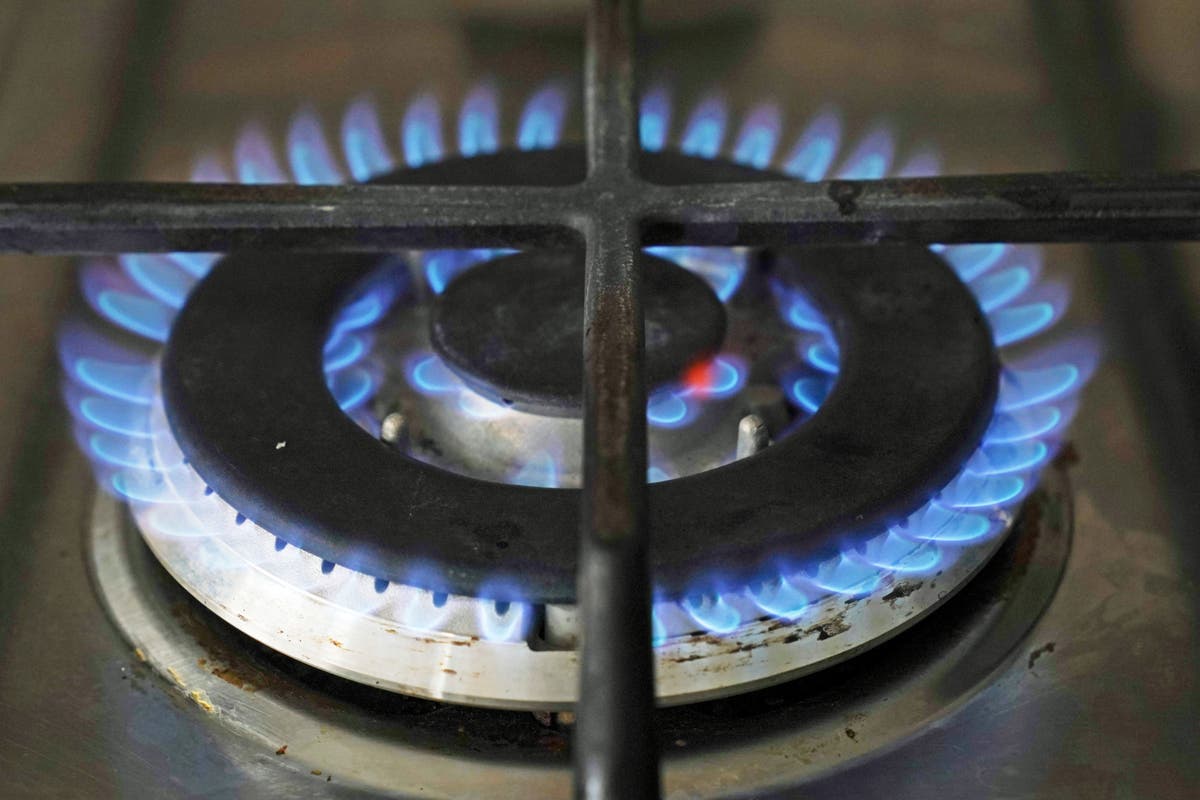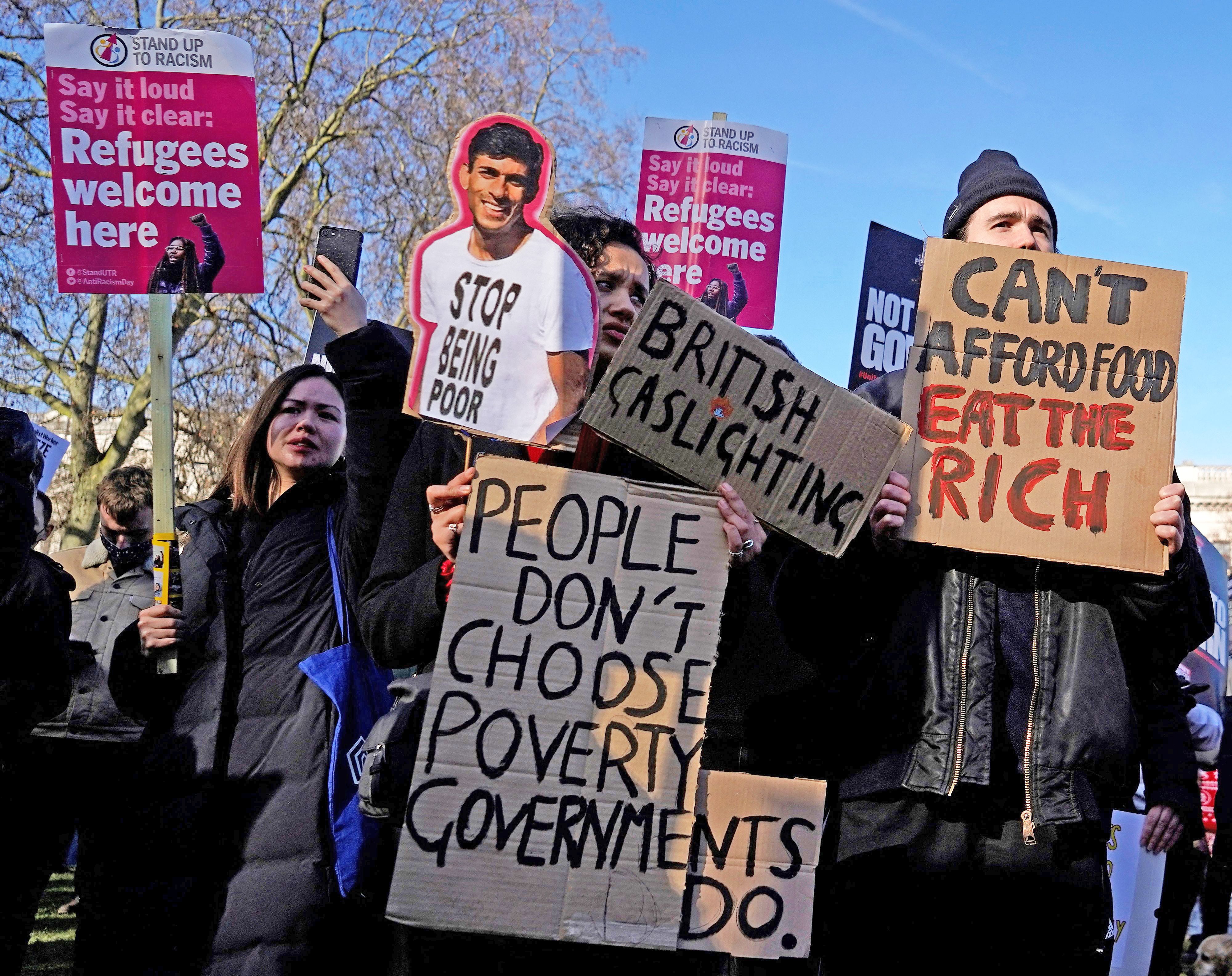Energy bills: Fuel cost hike puts pressure on families amid unprecedented £700 rise
Householders say they sometimes don’t eat to save money as people face cost-of-living crisis
Your support helps us to tell the story
From reproductive rights to climate change to Big Tech, The Independent is on the ground when the story is developing. Whether it's investigating the financials of Elon Musk's pro-Trump PAC or producing our latest documentary, 'The A Word', which shines a light on the American women fighting for reproductive rights, we know how important it is to parse out the facts from the messaging.
At such a critical moment in US history, we need reporters on the ground. Your donation allows us to keep sending journalists to speak to both sides of the story.
The Independent is trusted by Americans across the entire political spectrum. And unlike many other quality news outlets, we choose not to lock Americans out of our reporting and analysis with paywalls. We believe quality journalism should be available to everyone, paid for by those who can afford it.
Your support makes all the difference.Families have described how they are struggling to cover their food and energy costs as annual energy bills rise by around £700.
One site manager told The Independent how he couldn’t afford to socialise any more, and a hairdressing business owner said he could not always afford meals, saying: “Sometimes I eat, sometimes I don’t”.
The £693-a-year rise in a typical energy bill will affect 18 million households, and 4.5 million customers on prepaid meters will face an increase of £708 a year.
The rising prices will double the number of households in “fuel stress” – a term for those spending 10 per cent or more of their income after housing costs on energy bills – overnight from 2.5 to 5 million in England alone, according to the Resolution Foundation think tank.
Protesters from the climate group Just Stop Oil blocked “10 critical oil terminals” across the UK this morning, as the biggest rise in British energy bills takes effect.
See below for how our live coverage unfolded.
EDF Energy ask customers to submit readings via online form amid website crash
EDF Energy are now asking customers to submit their metre readings via an online form as its website and app continue to suffer “technical issues”.
As a result of the high volumes of metre readings being submitted today, the energy supplier has also asked customers limit calls to urgent queries only.
A post on their website said it is working hard to “resolve” the issues quickly, adding: “Customers who have a smart meter, or are on a fixed tariff, don’t need to do anything at the moment.
“Please only call us if your query is urgent, so that we can continue to support our most vulnerable customers. We’re really sorry about the inconvenience this is causing.”
Martin Lewis urges people to take photo of meter reading
Money saving expert Martin Lewis has urged Brits who are struggling to submit their meter readings online to take a photo of it, adding: “you’ve usually up to a week to get it to them.”
Mr Lewis was earlier blamed by energy suppliers for a surge in people attempting to submit their readings online, causing several websites to crash.
Here’s his latest advice:
When do gas and electric prices go up and why? The energy price rise explained
The UK’s energy price cap, the maximum amount a utility company can charge an average customer per year for the amount of electricity and gas they use, has just been reviewed and risen by 54 per cent, meaning a steep rise in household bills this spring.
From 1 April, the cap will rise from £1,277 to £1,971 for a household on average usage. That means a £693 per year increase for the average customer.
Prepayment meter customers will see an even greater increase of £708 from £1,309 to £2,017.
Joe Sommerlad has more:

When do gas and electric prices go up and why? The energy price rise explained
How much have gas and electricity prices gone up?
Fracking moratorium a ‘political stunt’, says Labour
A Labour MP has called the moratorium on fracking announced during the 2019 election a “political stunt” after regulators lifted an order for Cuadrilla to plug its wells in Lancashire today.
Cat Smith, MP for Lancaster and Fleetwood, said: “Is this the Tories re-opening the door to fracking again?”
How to get a council tax rebate as cost of living rises
The cost of living is going up and households are expected to see energy bills increase by an estimated 54 per cent on Friday, 1 April.
It’s not just energy prices which will rise to the highest costs in living memory, but the price of everyday items is set to rise too as well as other bills such as internet and council tax.
Earlier this month, the government urged households to get ready for the £150 council tax rebate which they could claim by setting up a direct debit with their local council.
All 28 million households in the UK will be given a £200 rebate from the government towards their energy bill this year too.
Laura Hampson has more:

How to get a council tax rebate as cost of living rises
Plus, everything you need to know about the government’s energy bill rebate scheme
Five million households face energy budget crunch as bills soar overnight
Five million households will be forced to spend at least 10 per cent of their budget on energy bills after today’s price cap hike, according to the latest analysis.
The prediction comes as the limit on bills leaps by 54 per cent, adding an average of £693 a year to the cost for those on default tariffs.
The price rises will double the number of households in “fuel stress” – a term for those spending 10 per cent or more of their income after housing costs on energy bills – overnight from 2.5 to 5 million in England alone, according to the Resolution Foundation think tank. The figures account for chancellor Rishi Sunak’s recent intervention to ease the impact, report Anna Isaac and Simon Murphy:

Five million households face energy budget crunch as bills soar overnight
Boris Johnson and Rishi Sunak condemned by Labour’s Ed Miliband for ‘refusing to go further to support the British people facing a cost of living crisis’
Biggest jump in energy bills in living memory comes into effect
The biggest jump in domestic energy bills in living memory has now come into effect.
The energy price cap for those on default tariffs who pay by direct debit is rising by £693 from £1,277 to £1,971 from today.
Prepayment customers will see a bigger jump, with their price cap going up by £708, from £1,309 to £2,017.
The regulator hiked the energy price cap to a record £1,971 for a typical household as gas prices soared to unprecedented highs.
Fuel poverty charity National Energy Action (NEA) warned the cost of heating an average home has now doubled in 18 months, leaving 6.5 million households unable to live in a warm, safe home across the UK.
An Ofgem spokeswoman said: “We know this rise will be extremely worrying for many people.
“The energy market has faced a huge challenge due to the unprecedented increase in global gas prices, a once in a 30-year event, and Ofgem’s role as energy regulator is to ensure that, under the price cap, energy companies can only charge a fair price based on the true cost of supplying electricity and gas.
“Ofgem is working to stabilise the market and over the longer term to diversify our sources of energy, which will help protect customers from similar price shocks in the future.”
Inflation surge will escalate in coming months, British Chamber of Commerce survey says
The British Chambers of Commerce (BCC) said its latest quarterly survey has found that almost two-thirds of UK firms are expected to raise prices over the next three months, the highest since the survey began in 1989.
The survey was conducted across more than 5,600 firms.
The survey revealed that 62 per cent of firms expected their prices to rise in the next three months, up from 58 per cent in the fourth quarter of 2021, reported The Guardian.
Only 1 per cent expected a decrease in their prices.
When asked about what is leading firms to increase prices, 92 per cent of manufacturers cited raw materials, while 56 per cent pointed to energy and transport costs among other overheads.
A third of firms said the cost of labour was also influencing their decision to raise prices.
Suren Thiru, the BCC’s head of economics said in a statement: “High price pressures suggests that the current inflationary surge will escalate significantly in the coming months.
“The reversal of the hospitality VAT cut, the higher energy price cap and soaring energy and commodity prices amid Russia’s invasion of Ukraine, should lift inflation well above 8 per cent in the near term.”

Websites crash as customers rush to submit energy bills
Consumer groups have criticised energy firms for failing to avert a widescale crash of their websites as customers rushed to submit meter readings ahead of Friday’s price jump.
Customers reported issues logging in to supplier websites including British Gas, EDF, E.On, SSE, So Energy and Octopus Energy from early on Thursday.
Josie Clarke has more:

Energy firms criticised as websites crash in rush to submit meter readings
Customers have been advised to send in their readings ahead of a jump in energy prices on Friday.
Two in five households are in fuel poverty as energy bills soar
Two and a half million households with children are in fuel poverty after the new energy price cap came into effect today, according to estimates from the End Fuel Poverty Coalition.
The survey says that this amounts to two in five households, and rises to more than half if only single-parent homes are considered, reported Sky News.
The fuel poverty definition used here is a household that spends more than 10 per cent of its income on energy bills.
The survey estimated that up to 9 in 10 people are estimated to be fuel poor in the Bushbury and Low Hill area of Wolverhampton, the worst affected neighbourhood in the country.

Subscribe to Independent Premium to bookmark this article
Want to bookmark your favourite articles and stories to read or reference later? Start your Independent Premium subscription today.




Join our commenting forum
Join thought-provoking conversations, follow other Independent readers and see their replies
Comments